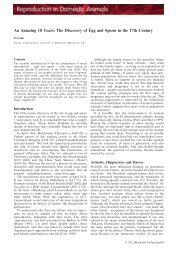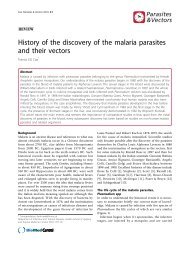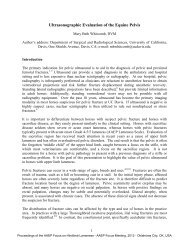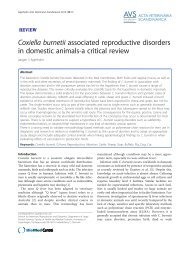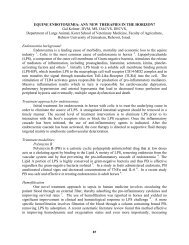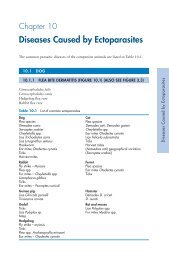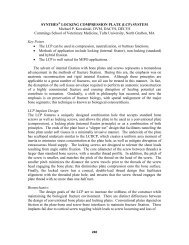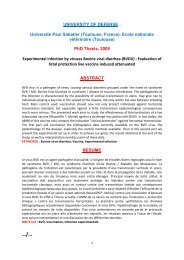- Page 3 and 4:
VIContentsChapter 9Evaluation of a
- Page 5:
XPrefaceless stress to the female,
- Page 8 and 9:
2Artificial Insemination in Farm An
- Page 10 and 11:
4Artificial Insemination in Farm An
- Page 12 and 13:
6Artificial Insemination in Farm An
- Page 14 and 15:
8Artificial Insemination in Farm An
- Page 16 and 17:
10Artificial Insemination in Farm A
- Page 18 and 19:
12Artificial Insemination in Farm A
- Page 20 and 21:
14Artificial Insemination in Farm A
- Page 22 and 23:
16Artificial Insemination in Farm A
- Page 24 and 25:
18Artificial Insemination in Farm A
- Page 26 and 27:
20Artificial Insemination in Farm A
- Page 28 and 29:
22Artificial Insemination in Farm A
- Page 30 and 31:
24Artificial Insemination in Farm A
- Page 32 and 33:
26Artificial Insemination in Farm A
- Page 34 and 35:
28Artificial Insemination in Farm A
- Page 36 and 37:
30Artificial Insemination in Farm A
- Page 38 and 39:
32Artificial Insemination in Farm A
- Page 40 and 41:
34Artificial Insemination in Farm A
- Page 42 and 43:
36Artificial Insemination in Farm A
- Page 44 and 45:
38Artificial Insemination in Farm A
- Page 46 and 47:
40Artificial Insemination in Farm A
- Page 48 and 49:
42Artificial Insemination in Farm A
- Page 50 and 51:
44Artificial Insemination in Farm A
- Page 52 and 53:
46Artificial Insemination in Farm A
- Page 54 and 55:
48Artificial Insemination in Farm A
- Page 56 and 57:
50Artificial Insemination in Farm A
- Page 58 and 59:
52Artificial Insemination in Farm A
- Page 60 and 61:
54Artificial Insemination in Farm A
- Page 62 and 63:
56Artificial Insemination in Farm A
- Page 64 and 65:
58Artificial Insemination in Farm A
- Page 66 and 67:
60Artificial Insemination in Farm A
- Page 68 and 69:
62Artificial Insemination in Farm A
- Page 70 and 71:
64Artificial Insemination in Farm A
- Page 72 and 73:
66Artificial Insemination in Farm A
- Page 74 and 75:
68Artificial Insemination in Farm A
- Page 76 and 77:
70Artificial Insemination in Farm A
- Page 78 and 79:
72Artificial Insemination in Farm A
- Page 80 and 81:
74Artificial Insemination in Farm A
- Page 82 and 83:
76Artificial Insemination in Farm A
- Page 84 and 85: 78Artificial Insemination in Farm A
- Page 86 and 87: 80Artificial Insemination in Farm A
- Page 88 and 89: 82Artificial Insemination in Farm A
- Page 90 and 91: 84Artificial Insemination in Farm A
- Page 92 and 93: 86Artificial Insemination in Farm A
- Page 94 and 95: 88Artificial Insemination in Farm A
- Page 96 and 97: 90Artificial Insemination in Farm A
- Page 98 and 99: 92Artificial Insemination in Farm A
- Page 100 and 101: 94Artificial Insemination in Farm A
- Page 102 and 103: 96Artificial Insemination in Farm A
- Page 104 and 105: 98Artificial Insemination in Farm A
- Page 106 and 107: 100Artificial Insemination in Farm
- Page 108 and 109: 102Artificial Insemination in Farm
- Page 110 and 111: 104Artificial Insemination in Farm
- Page 112 and 113: 106Artificial Insemination in Farm
- Page 114 and 115: 108Artificial Insemination in Farm
- Page 116 and 117: 110Artificial Insemination in Farm
- Page 118 and 119: 112Artificial Insemination in Farm
- Page 120 and 121: 114Artificial Insemination in Farm
- Page 122 and 123: 116Artificial Insemination in Farm
- Page 124 and 125: 118Artificial Insemination in Farm
- Page 126 and 127: 120Artificial Insemination in Farm
- Page 128 and 129: 122Artificial Insemination in Farm
- Page 130 and 131: 124Artificial Insemination in Farm
- Page 132 and 133: 126Artificial Insemination in Farm
- Page 136 and 137: 130Artificial Insemination in Farm
- Page 138 and 139: 132Artificial Insemination in Farm
- Page 140 and 141: 134Artificial Insemination in Farm
- Page 142 and 143: 136Artificial Insemination in Farm
- Page 144 and 145: 138Artificial Insemination in Farm
- Page 146 and 147: 140Artificial Insemination in Farm
- Page 148 and 149: 142Artificial Insemination in Farm
- Page 150 and 151: 144Artificial Insemination in Farm
- Page 152 and 153: 146Artificial Insemination in Farm
- Page 154 and 155: 148Artificial Insemination in Farm
- Page 156 and 157: 150Artificial Insemination in Farm
- Page 158 and 159: 152Artificial Insemination in Farm
- Page 160 and 161: 154Artificial Insemination in Farm
- Page 162 and 163: 156Artificial Insemination in Farm
- Page 164 and 165: 158Artificial Insemination in Farm
- Page 166 and 167: 160Artificial Insemination in Farm
- Page 168 and 169: 162Artificial Insemination in Farm
- Page 170 and 171: 164Artificial Insemination in Farm
- Page 172 and 173: 166Artificial Insemination in Farm
- Page 174 and 175: 168Artificial Insemination in Farm
- Page 176 and 177: 170Artificial Insemination in Farm
- Page 178 and 179: 172Artificial Insemination in Farm
- Page 180 and 181: 174Artificial Insemination in Farm
- Page 182 and 183: 176Artificial Insemination in Farm
- Page 184 and 185:
178Artificial Insemination in Farm
- Page 186 and 187:
180Artificial Insemination in Farm
- Page 188 and 189:
182Artificial Insemination in Farm
- Page 190 and 191:
184Artificial Insemination in Farm
- Page 192 and 193:
186Artificial Insemination in Farm
- Page 194 and 195:
188Artificial Insemination in Farm
- Page 196 and 197:
190Artificial Insemination in Farm
- Page 198 and 199:
192Artificial Insemination in Farm
- Page 200 and 201:
194Artificial Insemination in Farm
- Page 202 and 203:
196Artificial Insemination in Farm
- Page 204 and 205:
198Artificial Insemination in Farm
- Page 206 and 207:
200Artificial Insemination in Farm
- Page 208 and 209:
202Artificial Insemination in Farm
- Page 210 and 211:
204Artificial Insemination in Farm
- Page 212 and 213:
206Artificial Insemination in Farm
- Page 214 and 215:
208Artificial Insemination in Farm
- Page 216 and 217:
210Artificial Insemination in Farm
- Page 218 and 219:
212Artificial Insemination in Farm
- Page 220 and 221:
214Artificial Insemination in Farm
- Page 222 and 223:
216Artificial Insemination in Farm
- Page 224 and 225:
218Artificial Insemination in Farm
- Page 226 and 227:
220Artificial Insemination in Farm
- Page 228 and 229:
222Artificial Insemination in Farm
- Page 230 and 231:
224Artificial Insemination in Farm
- Page 232 and 233:
226Artificial Insemination in Farm
- Page 234 and 235:
228Artificial Insemination in Farm
- Page 236 and 237:
230Artificial Insemination in Farm
- Page 238 and 239:
232Artificial Insemination in Farm
- Page 240 and 241:
234Artificial Insemination in Farm
- Page 242 and 243:
236Artificial Insemination in Farm
- Page 244 and 245:
238Artificial Insemination in Farm
- Page 246 and 247:
240Artificial Insemination in Farm
- Page 248 and 249:
242Artificial Insemination in Farm
- Page 250 and 251:
244Artificial Insemination in Farm
- Page 252 and 253:
246Artificial Insemination in Farm
- Page 254 and 255:
248Artificial Insemination in Farm
- Page 256 and 257:
250Artificial Insemination in Farm
- Page 258 and 259:
252Artificial Insemination in Farm
- Page 260 and 261:
254Artificial Insemination in Farm
- Page 262 and 263:
256Artificial Insemination in Farm
- Page 264 and 265:
258Artificial Insemination in Farm
- Page 266 and 267:
260Artificial Insemination in Farm
- Page 268 and 269:
262Artificial Insemination in Farm
- Page 270 and 271:
264Artificial Insemination in Farm
- Page 272 and 273:
266Artificial Insemination in Farm
- Page 274 and 275:
268Artificial Insemination in Farm
- Page 276 and 277:
270Artificial Insemination in Farm
- Page 278 and 279:
272Artificial Insemination in Farm
- Page 280 and 281:
274Artificial Insemination in Farm
- Page 282 and 283:
276Artificial Insemination in Farm
- Page 284 and 285:
278Artificial Insemination in Farm
- Page 286 and 287:
280Artificial Insemination in Farm
- Page 288 and 289:
282Artificial Insemination in Farm
- Page 290 and 291:
284Artificial Insemination in Farm
- Page 292 and 293:
286Artificial Insemination in Farm
- Page 294 and 295:
288Artificial Insemination in Farm
- Page 296 and 297:
290Artificial Insemination in Farm
- Page 298 and 299:
292Artificial Insemination in Farm
- Page 300 and 301:
294Artificial Insemination in Farm
- Page 302 and 303:
296Artificial Insemination in Farm
- Page 304 and 305:
298Artificial Insemination in Farm
- Page 306:
300Artificial Insemination in Farm



